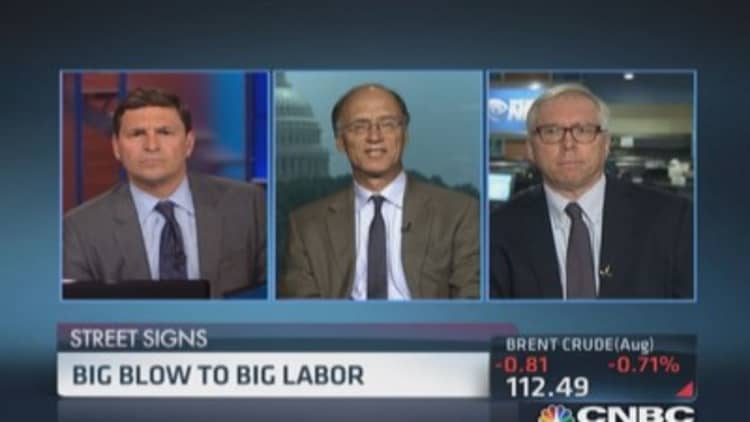The ports along the nation's West Coast are still open, but one researcher who's studied them says that obstacles like labor walkouts are threatening their ability to stay in business more than a decade after a devastating dock workers' strike in 2002.
"They can't stand another disruption regardless of management or labor," said John Martin, founder of Martin Associates, an economic research firm for transportation systems.
And it's not only the ports themselves that will get hit by a strike, said Tony Cherin, a financial markets professor at San Diego State University.
"Wholesalers, retailers and consumers will see prices go up if trucks aren't leaving the ports," he said. "The impact will be greater the longer a strike goes on."
Martin, who wrote a study this April on the challenges facing the ports, explained that when the 2002 strike lasted for 10 days, importers and exporters began to turn to alternatives such as East Coast ports for their cargo.
That cost the West Coast ports. Their share of imports has declined since 2002. It's now 43.6 percent, down from a 2002 high of more than 50 percent.
However, the ports, from Los Angeles to Seattle-Tacoma, Washington, remain a big part of the economy. They provide more than 400,000 jobs directly or indirectly related to the handling of cargo. An additional 8.7 million jobs are tied to goods that flow in and out of the ports each day.
Operations at the ports contributed $2.1 trillion to the U.S. economy in 2013, about 12.5 percent of the nation's gross domestic product.
Read MoreEmployers say they can't fill jobs—and here's why
"If you start disrupting this supply chain, the West Coast ports will continue to lose out more than they have," said Martin.
'Standing up for our rights'
Dock workers are currently on the job, but their union is negotiating a new coastwide contract over items like higher pay and health benefits. They are temporarily working under the old contract, which expired last week.
What's more visible for now is the recent walkout by dozens of port truck drivers against three of the trucking companies that use the Los Angeles-area ports.
The issue is over job classification, The truckers want to be considered full-time employees with benefits, better pay and job security, while the companies want to keep them as independent contractors.
"This is about standing up for our rights," said 34-year-old Alex Paz, a trucker who said that he was fired in May from a trucking job after speaking out at a labor commission meeting.
Read MoreMillionaires support four-day workweek
Paz said that as an independent contractor, drivers get paid only by the load and must pay a lease for their truck. They have to pay fees to park the vehicle, and for fuel and any damages to the truck, as well. Fuel can cost up to $450 a week, and with other expenses, truckers can see $800 deducted from each weekly check.
Taking days off work is costly for drivers, too, Paz said.
"A few years back when my son was born I missed a few days, and when I came back to work, they still deducted money from my check," Paz said.

The three trucking companies, Green Fleet Systems, Pacific 9 Transportation and Total Transportation Services, have blamed outside interests for the action. The Teamsters Union and the United Farm Workers have backed the drivers.
Green Fleet said in an email to CNBC that: "The fact is that an overwhelming majority of contractors and drivers affiliated with Green Fleet don't want these groups involved in their work. Green Fleet will continue to service its customers and pay its drivers some of the best rates in the industry while doing so."
Read MoreMore jobs being posted, but wages aren't budging
It was in June that the National Labor Relations Board brought a complaint against Green Fleet alleging that it wrongly terminated and disciplined workers while encouraging them to sign an anti-union petition.
Looming competition, regardless
The ports of Los Angeles and Long Beach, California, were briefly closed on Tuesday when dock workers there honored the picket lines of the truckers. But an arbitrator ruled the workers had to go back to work, and the ports reopened and remain so.
Picketers are making it difficult to unload the truck cargo, but most loads are getting through.
Truck drivers have staged three other work actions over the past few months, but this one has no end date. The trucking companies say they are standing firm.
Read MoreTop court ruling: 'Laboor unions are not wanted'
Meanwhile, the dock workers themselves must reach a deal on a new contract.
They might be on strike if talks break down. Even if the dock workers did get the deal they wanted, they could get the arbitration ruling reversed and go back to honoring the picket lines of the truck drivers.
But John Martin pointed out that even if the labor struggles are resolved, the ports still face competition.
"The expansion of the Panama Canal to handle bigger cargo ships as well as the growing interest by countries in the Suez Canal will encourage more shipping to East Coast cities," he said.
—By CNBC's Mark Koba

